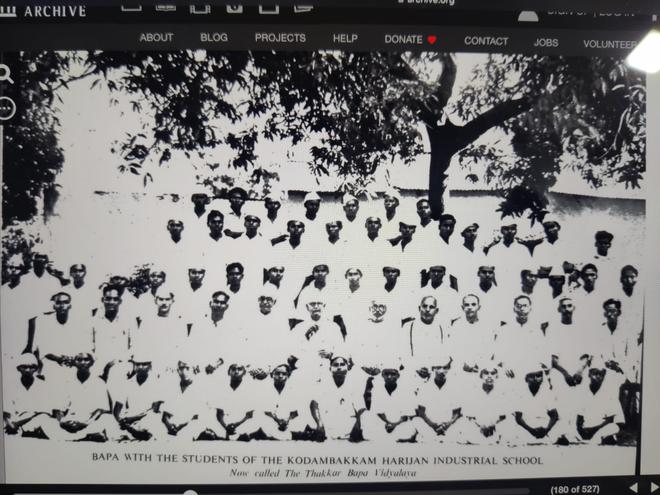
To many, the seven-decades-old Thakkar Bapa Vidyalaya on Venkatanarayana Road at T. Nagar in Chennai may seem an ordinary school. But the purpose of its establishment and, more importantly, the person after whom it is named has a prominent historical relevance.
Opened in 1947 and named after Amritlal Vithaldas Thakkar (fondly called Thakkar Bapa) at the insistence of Mahatma Gandhi, the establishment carries on the legacy of the Father of ‘Harijans’, as Thakkar Bapa is known: the uplift of the oppressed.
The majority of Thakkar Bapa’s visits to Madras and the other districts of the present day Tamil Nadu were part of his tour accompanying the Mahatma between 1933 and 1934 across British Indian colonies — from Wardha to Varanasi, barring some princely states — and during various periods well into the late 1940s. Most of his work involved visiting colonies of ‘Harijans’ (Dalits), a term coined by the Mahatma for those deemed “untouchables”, and carrying out relief measures through the branches of the Harijan Sevak Sangh, of which he was the general secretary.
Swadeshi exhibition
“They [the Mahatma and Thakkar Bapa with their followers] visited Madras Province on December 20, 1933, conducted a Swadeshi exhibition, and met railway and Gujarati workers. They left three days later and reached Kanniyakumari (then part of the Travancore princely state) in January 1934, from where they toured various districts in the present day Tamil Nadu for a month, before visiting other parts of the country...,” Chithra Balasubramanian, a Gandhian researcher and former lecturer, told The Hindu, quoting from a volume of the collected works on the Mahatma.
Besides interaction with the Dalits, the aim of the tours was to raise funds for their welfare. “There was something magical about Thakkar Bapa’s powers of appeal. He had a way of command different from that of others and his pleas reached the people more often,” says Pandian, president, Thakkar Bapa Vidyalaya.
“In those days, Dalit children were denied entry to normal schools. Members of the Harijan Sevak Sangh, which was formed by Gandhi, went to their colonies, persuaded them to send their children to school and, through funds raised with the help of Thakkar Bapa, constructed schools and hostels for many of them,” recalls the nonagenarian.
Mr. Pandian joined the Sangh in 1964 and heard about these events from L.N. Gopalaswamy, who was the secretary of the Sangh’s Madras branch.
What Dalit students needed, besides the regular education, was training in vocational skills, such as carpentry and other handicrafts, to lead an independent and dignified life. Hence, the schools at various places were transformed into industrial-cum-residential schools, Mr. Pandian says.
Some such schools had functioned in Madras Province. “There are two big residential vocational schools, one in Delhi and the other in Madras, where over 280 boys are being trained in handicrafts,” reads an excerpt from the Commemoration Volume on Thakkar Bapa, which was released on his 80th birthday.
The industrial school that was opened at Kodambakkam by the Mahatma and that was later shifted to an alternative location and came to be known as Thakkar Bapa Vidyalaya also serves this purpose.
Scholarships for students
Various other hostels and institutions also functioned under the care of the Sangh in Madras, including a girls’ hostel and Gokhale Young Men’s Association at Perambur. A report published in The Hindu on October 22, 1936 documents Thakkar Bapa’s visit to these places. The students of these institutions were also awarded scholarships, says Ms. Chithra.
According to Mr. Pandian, Thakkar Bapa’s another notable contribution was the mitigation of the burden of manual scavengers. “Their travails were unimaginable. In a village at Subramaniapuram, besides collecting the refuse of the ‘dominant ’castes, they had to carry and dump it near their residences, as disposing it of elsewhere was unacceptable. Bapa came out in support of them, urged the municipality to arrange vehicles to carry away the human waste collected elsewhere so that the scavengers could at least reside in hygienic conditions,” recalls Mr. Pandian.
Reaching out
Cheries in Madura, a written excerpt of Thakkar Bapa available in the The Hindu Archives, dated April 1, 1935, recalls his experience of visiting three cheries (Dalit hamlets) of the second town of Madras Presidency, inhabited by sweepers and scavengers. Thakkar Bapa appeals to the municipality: “...It is an obligatory duty of the municipality to build sufficient and sanitary houses for its scavengers; the sooner the legislature moves in the matter and ruthlessly enforces it, the better...”
Inspired by Thakkar Bapa, other personalities, like G.S. Lakshman Iyer, tried to rid society of manual scavenging. Their efforts bore fruit at places like Gobichettipalayam, says Annamalai, Director, Desiya Gandhiya Arunkachiyakam.
“It wasn’t just about manual scavenging. Inspired by him, various people in Tamil Nadu and across the country worked for the uplift of Dalits. Entry of Dalits in the Meenakshi Sundareswarar Temple in 1939, facilitated by eminent lawyer A. Vaidyanathan Iyer, was inspired by Gandhi and Thakkar Bapa,” Mr. Annamalai adds.
Prior to joining the Harijan Sevak Sangh, Thakkar Bapa had served in the Servants of India Society in 1914, founded by Gopal Krishna Gokhale. Despite having worked as a civil engineer, he turned to social service.
“He is a pioneer of selfless work, and has travelled places even in bad health for social work. Though he used to keep a diary, a habit inculcated in true Gandhians, and some of his letters and accounts are available in some volumes of The Harijan, there is still a need to document his accounts and life in one place. The present information is very cluttered,” says Ms. Chithra. Mr. Annamalai echoes this view.
Rumoured references
Asked about the more recent references to Thakkar Bapa in Tamil Nadu, especially in movies, as Appatakkar, rumoured to be evolved from the words, Thakkar Appa, Mr. Annamalai denies any connection between them. “They are unrelated,” he asserts. “If anything, it is derogatory...,” adds Ms. Chithra.







